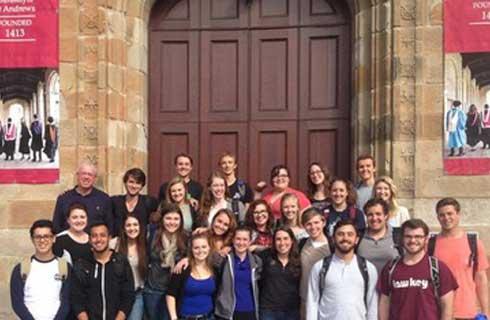基础免疫学哲学博士-先天免疫
Doctor of Philosophy in Fundamental Immunology - Innate Immunity

学历文凭
Ph.D.

专业院系
Department of Immunology

开学时间

课程时长

课程学费

国际学生入学条件
IDP—雅思考试联合主办方

雅思考试总分
7.0
了解更多
雅思考试指南
- 雅思总分:7
- 托福网考总分:93
- 托福笔试总分:580
- 其他语言考试:Certificate of Proficiency in English (COPE) - Required score - 76 (with at least 22 in each component and 32 in the writing component)
CRICOS代码:
申请截止日期: 请与IDP顾问联系以获取详细信息。
课程简介
The Department of Immunology offers graduate programs leading to the Master of Science and Doctor of Philosophy degrees in a wide range of immunological disciplines. These disciplines include molecular mechanisms of lymphocyte development and selection, T-cell and B-cell receptors, cell interactions, growth factor receptors, cytokine networks, antigen processing and presentation, signal transduction in lymphocytes, V(D)J recombination, anergy, apoptosis, transgenic and knock-out models, immuno-targeting and vaccine design, autoimmunity, AIDS, diabetes, and transplantation.The department provides a common forum for investigators in many areas of U of T and an interdisciplinary research experience in immunology. Members and students in the department are located at the Medical Sciences Building, at the Ontario Cancer Institute, and at the Research Institutes of Mt. Sinai Hospital, Toronto General Hospital, Toronto Western Hospital, The Hospital for Sick Children, and Sunnybrook Hospital. The PhD degree is an advanced research degree intended to reflect a level of training consistent with the ability of the candidate to function as an independent research scientist. This involves successful completion of course work reflecting a knowledge of modern immunology, as well as a demonstrated ability to carry out research of publishable quality.Innate immunity is that which reflects our immediate biological defense against the outside world. It is characterized by discrimination of what is self versus nonself, or harmless versus dangerous. Innate immunity does not require prior sensitization ('memory') nor does it generate an augmented secondary ('recall') response. Many innate immune receptors are pattern recognition receptors (PRR's) that have evolved over millenia to recognize common pathogens in their simplest form, subunits known as pathogen-associated molecular patterns (PAMP's); these obligate pathogen-derived substances cannot easily be altered by the pathogen without loss of viability. In other instances, innate immune receptors recognize self ligands that may be displayed in a modulated fashion upon infection or transformation to notify the immune system that something is wrong. Cells of the innate immune system include macrophages and dendritic cells [the "professional" antigen-presenting cells (APC's)], polymorphonuclear leukocytes, and certain lymphocytes, such as natural killer cells, and even a repertoire of B cells that is fixed at birth. Cross-talk between the innate immune system and the adaptive immune system is critical for the mounting of an effective sterilizing immune response, such that without innate immunity, we cannot exist in nature.
相关申请
 预科
预科 奖学金
奖学金 实习机会
实习机会 在校学习
在校学习 跨境学习
跨境学习 校园授课-线上开始
校园授课-线上开始 在线/远程学习
在线/远程学习
学校排名

世界排名21
数据源:泰晤士高等教育世界大学排名
关于多伦多大学

多伦多大学(University of Toronto),始建于1827年,坐落在加拿大的第一大城市多伦多,是加拿大的一所顶尖学府,亦为加拿大传统四大校之一。安大略省政府及议会环绕在市中心的女王公园四周,现已发展成为一所“一主两翼”格局的世界知名研究性大学--坐落于市中心的圣乔治校区(St. George),历史最为悠久,与3个更小的大学联盟并有享有七大学院制,与十座教学医院有着密切关系;东西向延伸至世嘉堡与密西沙加,UTSC有着乡村般的风光,风景别致,搭乘TTC一小时路程;UTM则是在西边,有校车往返。在学术及研究方面,多伦多大学一直处于领先地位。其经费、捐款、国家教授奖项、研究出版规模和藏书量皆为加拿大之首。多伦多大学出版社在加拿大乃至全北美影响深远。实行独立书院制的学府,荣获诺贝尔奖的教授人数是加拿大最多的。维多利亚学院是其最富有的学院之一 提供更多奖学金和相关设施。多伦多大学亦为美国大学协会中仅有的两所非美国学府之一。多伦多大学每年发表的科研论文数量在北美仅次于哈佛大学,引用数量位居世界前五。主要贡献:干细胞及胰岛素的发现,电子起搏器、多点触摸技术、电子显微镜、抗荷服的发明和发展,NP完全理论,以及发现首个经核证的黑洞。
本校相关课程
其他相关课程

微生物学和免疫学哲学博士
 麦吉尔大学继续教育学院
麦吉尔大学继续教育学院学历文凭
Ph.D.
开学日期
课程费用总额


微生物学和免疫学理学硕士(论文)
 麦吉尔大学继续教育学院
麦吉尔大学继续教育学院学历文凭
Masters Degree
开学日期
课程费用总额


微生物学和免疫学理学学士学位(荣誉学位)
 麦吉尔大学继续教育学院
麦吉尔大学继续教育学院学历文凭
Bachelor Degree with Honours
开学日期
课程费用总额


微生物学和免疫学理学学士
 麦吉尔大学继续教育学院
麦吉尔大学继续教育学院学历文凭
Bachelor Degree
开学日期
课程费用总额


免疫学理学学士(荣誉学位)
 麦吉尔大学继续教育学院
麦吉尔大学继续教育学院学历文凭
Bachelor Degree with Honours
开学日期
课程费用总额


免疫学哲学博士
 卡尔加里大学
卡尔加里大学学历文凭
Ph.D.
开学日期
课程费用总额
































